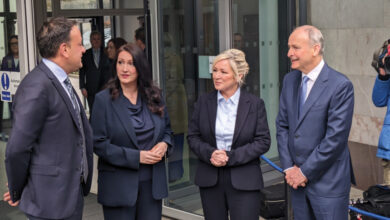Cork County Council: ‘A progressive, innovative, and high performing local authority’

Since 1899, Cork County Council has been tasked with delivering services on behalf of the citizens and communities of County Cork. Marking its 125th year, interim Chief Executive, Valerie O’Sullivan, speaks with eolas Magazine.
Speaking from Cork County Council’s County Hall headquarters – and Cork city’s tallest building at 17-storeys – O’Sullivan reflects on the vast range of services delivered by the local authority on behalf of its citizens. In fact, in 2023, the council was awarded the Pride of Place award for council community engagement in recognition of this endeavour.
“Public service is the shared purpose which drives Cork County Council – from our frontline service providers to those working in administration and management – as a progressive, innovative, and high performing local authority.
“Equipped with a budget of €458.3 million, and instilled with an innate sense of placemaking, our people seek to make County Cork a better place to live, work, and invest in,” she asserts.

O’Sullivan became the first female chief of the local authority when she was appointed as interim CEO in October 2023. With Ann Doherty serving as her counterpart in Cork City Council, it marks the first time that both of Cork’s local authority chiefs are female.
However, the Cork County chief does not dwell on this development. “For a long time, I was the only female director of services on the management team of Cork City Council, and it never occurs to me. My belief is that the best person should get the job,” she says before qualifying: “From an external perspective, however, it may seem remarkable that women are now leading each of the local authorities.”
A public servant since the age of 18, O’Sullivan started her local authority career as a library assistant before becoming a clerical officer in Cork City Council in the mid-1990s. From there, she was continuously promoted, serving as director of various services, including corporate affairs, housing, operations, and environment and recreation, before joining Cork County Council in February 2020 as a divisional manager. “The potential for job satisfaction and making a tangible difference to people’s lives is much greater in local government than in many other areas,” she observes.
Home to around 400,000 citizens, Cork County Council is the second largest local authority in the State by population, and the largest based on geographic area. In fact, over the last three decades, population growth in County Cork has exceeded the average of the State. “It is extremely diverse,” O’Sullivan remarks, adding: “There are over 12,000km of roads in the county alone which provides some scale of the geographic area that we manage. We have urban centres, the metropolitan area, rural villages, coastline, industry and agriculture in our county.”
Three divisions
It is necessary, therefore, to divide the county into three manageable divisional units: north Cork, south Cork, and west Cork. Each of these have different challenges and opportunities and as such, Cork County Council has established teams “to specifically address the nuances of each”.
“South Cork is a powerhouse of industry and commerce and extends from as far east as Youghal and as far west as Ballingeary, encompassing a string of metropolitan towns, the biggest of which is Carrigaline. This landmass also includes Cork Harbour which is home to 35,000 jobs and counting,” O’Sullivan explains.
“Economic growth is on an upward trajectory in north Cork, with Mallow acting as key town given its geographic proximity to Limerick. The N20 will be important in its future development.
“Similarly, in a post-Covid context, west Cork has benefited from a socioeconomic revival, consolidating a tourism offering that is second to none. Meanwhile, more and more businesses and people are relocating to regions such as west Cork for work – whether remote or otherwise.
Investment location of choice
Throughout the pandemic, County Cork remained a location of choice for both investment and residential growth. “In fact, during Covid and immediately post-Covid, Cork County Council granted permissions for expansion to companies, like Stryker, PepsiCo, Pfizer, and Irish Distillers. Businesses like these were gearing up to capitalise on whatever would come next and, as an agile organisation, we were ready to assist them.
“Ultimately, the pandemic showcased the best of local government. We are here to serve citizens and as part of that, we must create conditions in which industry can thrive and employment can happen,” the Chief Executive acknowledges.
“Our message to any client – in any sector and including our own tenants and communities – is simple: ‘Whatever you need to achieve, Cork County Council will help you to make that happen.’ For instance, if an innovative opportunity emerged from within University College Cork, perhaps in collaboration with a local enterprise, and we recognised it discernible merit, we would provide whatever support necessary to ensure its success.
“At the same time, there is robust accountability which stands up to scrutiny. Central government departments and successive ministers recognise this and as such, we score highly on funding streams. When funding is allocated to Cork County Council, there is a tangible improvement in the locale. We are a ‘get things done’ local authority, with an excellent record of delivery, so the investment is worth it.”
Housing delivery
Outlining her current priorities as Chief Executive, O’Sullivan immediately identifies the delivery of social and affordable housing as a strategic policy area for the council. In the absence of adequate affordable housing supply, she maintains, we must guard against a message being sent to potential investors that “Ireland is no longer a destination where you can become established or expand because your employees will struggle to find accommodation. This must change, and we are working to ensure that message does not go out”.

“Public service is the shared purpose which drives Cork County Council.”
Valerie O’Sullivan, interim Chief Executive, Cork County Council
As such, Cork County Council is exploring options to expand its own landbank and also reappraising land zoning in the review of the Cork County Development Plan 2022-2028. “What we have found,” she outlines, “is that something beyond our control is posing a major challenge. While the planning process is working in our local authority, there is a significant gap between permissions granted and housing commencements. There is something inhibiting developers from commencing construction, whether it is the viability gap or otherwise. That is frustrating and must be tackled as a country.”
Regardless, launched in 2023, the Cork County Council Housing Delivery Action Plan 2022-2026 outlines how social and affordable housing demand can be met. Subject to ongoing review, the action plan set an ambitious target of delivering 3,198 new build social homes alongside 682 affordable homes by 2026.
“To date, our success in housing delivery has been achieved through effective collaboration with approved housing bodies, developers, and our elected members and has optimised the use of Cork County Council’s landbank,” the interim Chief Executive observes.
Offshore potential
At the same time, O’Sullivan believes that Ireland is on the cusp of an offshore renewable energy revolution. “With a national ambition of delivering at least 5GW of offshore wind energy, and an additional 2GW of green hydrogen sourced from offshore winds by 2030 – as per the Government’s Climate Action Plan 2024 – all boats point to Cork Harbour, certainly in the short-to-medium term,” she states.
“As the authority with responsibility for the economic development of the county – as well as the planning authority and the roads authority – Cork County Council has prepared a comprehensive and visionary Cork Harbour and Coastline Green Industrial and Economic Strategy. Our intention is that Cork Harbour be a first or early mover in this renewable energy space. There opportunity for significant jobs delivery, including in operation and maintenance is tremendous, and we must be ready.
“Cork Harbour is the second largest harbour in the world, yet it coexists in harmony with its environs, which include residential communities, a thriving tourism market, and stunning natural heritage. It is now time for us to capitalise on what could possibly be the next industrial revolution,” the council chief insists, “build our green energy parks and signal that Cork is ready for this next chapter in its development.”
Climate action
Meanwhile, 2023 heralded severe disruption from extreme weather phenomena which impacted east Cork in particular. This experience has prompted the county council to intensify its climate action initiatives, with a focus on immediate adaptation measures and longer-term education and skills capacity development.
Meeting its obligations as per the Climate Action and Low Carbon Development (Amendment) Act (2021), Cork County Council adopted its Climate Action Plan 2024-2029 in February 2024. Aligning with the national climate objectives and associated targets set by the Government, Cork County Council’s CAP roadmaps the local authority’s greenhouse gas emissions reduction pathway across all services and infrastructure.
“Climate change is a major policy priority, and as such it is at the forefront of Cork County Council’s programme. Our Climate Action Plan will enhance the climate resilience of the county through energy efficiency improvements, while reducing greenhouse gas emissions.
“Every individual director of service is embracing the Climate Action Plan, finding ways to implement it and deliver a transition in their own directorate,” O’Sullivan explains.
More specifically, the five-year plan makes provisions for Cork County’s first decarbonising zone (DZ) to be established in Macroom through the implementation of community-led climate mitigation, adaptation, and biodiversity initiatives. Successful projects will then be replicated elsewhere across the county.
County Development Plan Review
In April 2022, the Cork County Development Plan 2022-2028 was approved at full council and entered into effect in June 2022. In alignment with the National Planning Framework and the Regional Spatial and Economic Strategy for the Southern Region (RSES), the six-year plan, was published as a guide for future growth and development in the county.
Outlining Cork County Council’s planning policy objectives and its strategy for sustainable development, the county development plan aims to establish the local authority area “as an attractive, competitive and sustainable place to live, visit and do business, where the quality of its economy, natural and built environment, culture and the strength and viability of its rural and urban communities are to the highest standards”.
Almost two years since the county development plan was adopted in June 2022, Cork County Council is now undertaking a review which is set to be published later in 2024. “There has been significant change in the interim. With the publication of our Climate Action Plan and the council’s sustainable travel investment programme, allied to new funding provided by by stakeholders such as the National Transport Authority (NTA) and others, our emphasis must evolve. As I mentioned, there is also a much greater focus on renewable energy.”
Connectivity
Recognising the significance of transport and digital connectivity as drivers of employment and economic growth in a county the size of Cork, the county development plan commits to “prioritise infrastructure delivery across the county to enhance connectivity”. Through its three-year capital investment programme, the local authority plans to invest €1.5 billion in infrastructure projects between 2024 and 2025.
To date, Cork County Council has worked closely with National Broadband Ireland (NBI) to prioritise connectivity for localities that are not aligned with public transport corridors. “We are a county that affords citizens the opportunity to live wherever they choose and remain engaged in the workforce in terms of employment opportunities and promotion prospects.
“There is a very cohesive plan for the county, taking account of the fact that much of its rural and much of it is not. We must be as strategic as possible,” O’Sullivan outlines.
Vision
Looking beyond 2024, the council’s vision is for a thriving County Cork that is the location of choice for people to live in, work in, and invest in. “To a large extent, we are already realising this vision,” O’Sullivan indicates, adding: “Our challenge, therefore, is to consolidate that and capitalise on the opportunities that present themselves.”
Remarking on her wider vision, the Chief Executive emphasises the “exceptional track record” that local authorities such as her own have in terms of both “knowing what is needed, and, when we receive the funding, delivering”.
“Local government in Ireland should have enhanced decision-making powers and increased funding via a local government strategic investment fund. We should have that because local authorities’ knowledge and understanding of local needs and nuances is unmatched. Visit the Midleton to Youghal Greenway, the N22 Macroom Bypass, the Dunkettle Interchange, or the M28 Cork to Ringaskiddy Project – where the minute it was approved, we had shovels in the ground – and see what tangible delivery looks like. This is what happens when we are funded and trusted to deliver. Cork is worth the money,” she concludes.







